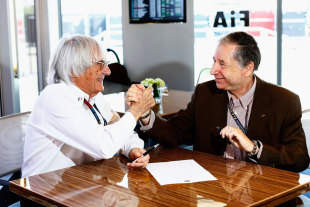
It's finally happened. Sort of.
As was widely publicised with a series of photos that looked more like an arm-wrestling competition than a deal-securing handshake, the Formula One Group and the FIA "have signed an agreement setting out the framework for implementation of the 2013 Concorde Agreement." So there's no Concorde just yet, but for the first time this year it can be said with confidence that the document itself is on its way.
While details of the Concorde Agreement are confidential, with the exact terms known only by its signatories, the paddock is a small environment in which people talk, and other people listen.
At the moment there are no details, because there is no Concorde. But having stood their ground in negotiations for many months - the last agreement expired on 31 December, 2012 - the FIA are thought to have gained a number of the concessions they were holding out for.
One of the most widely publicised sticking points was over media accreditation, which FOM wanted to bring entirely in-house. But it sounds as though the FIA has retained accreditation rights for journalists, putting paid to tales of costly press passes putting much of the print media out of a job.
A far bigger sticking point was the balance of power in the sport, which has long been firmly in the commercial rights holder's camp despite Formula One officially being the FIA's championship. Under the next Concorde Agreement there is rumoured to be a more equitable balance of power when it comes to decision-making, with FOM, the FIA, and teams having equal sway.
The goal is to create a system of checks and balances not dissimilar to Montesquieu's separation of powers, whereby if the FIA and FOM find themselves in direct opposition to each other over an issue, it will be the teams who decide whether to support the governing body or the CRH. In an ideal world, that will see the teams working as a cohesive unit to ensure that any decisions made are those that are best for the sport as a whole, and not those that favour the investors.
Of course, that's in an ideal world. Bitter experience teaches us that the teams are as capable as anyone else of making decisions with short-term benefits, and not long-term gains. Cooperation is not a speciality of the paddock.
And whatever happens with the new Concorde Agreement - whenever it is signed - it is worth remembering that the key players remain the same. FOM is FOM, the teams are competitive animals designed to be at war with each other, and the FIA is the FIA. Try what you will to change the script, if the actors and their motivations remain unchanged…
Both FOM and the FIA could see changes to their leadership over the seven-year term of the next Concorde. Should Jean Todt be re-elected FIA president at the end of this year, the Frenchman will not be allowed to seek the third consecutive term necessary to ensure he is in office for the next round of negotiations.
As for FOM, whatever the outcome of Bernie Ecclestone's ongoing German legal situation, the Formula One CEO is 82 years old. The next time a Concorde Agreement rolls around, he will be pushing 90, and unlikely to still be in charge of day-to-day operations for a high pressure global enterprise.
For real change, we should be looking to the 2020 Concorde Agreement, and not the 2013 edition.

